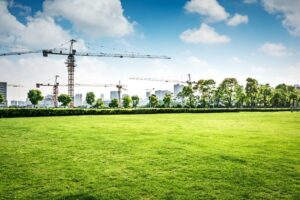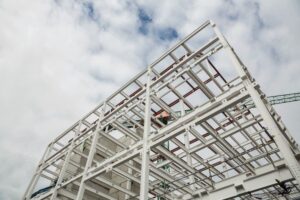
Understanding the Long-Term Life Cycle Cost of Your Factory
When planning a factory, it’s important to consider not just the initial construction costs but also the long-term life cycle cost. This comprehensive approach ensures that the factory remains economically viable throughout its operational life.
In India, where industrial growth is booming, understanding these costs is essential for maintaining competitive advantage and ensuring sustainable operations.
VMS Consultants is renowned as the best industrial PMC in India. With their expertise in cost analysis and project management, they can help businesses accurately assess and minimize the long-term life cycle cost of their factories, maximizing profitability and sustainability.
Let’s start with the basics.
What is Life Cycle Cost?
Life cycle cost (LCC) refers to the total cost of owning, operating, and maintaining a factory over its entire lifespan.
This includes the initial construction costs, ongoing operational expenses, maintenance, and eventual decommissioning or repurposing costs.
By analyzing these costs, factory owners can make informed decisions that balance short-term expenses with long-term savings and efficiency.
To make things easier to understand, we’ll break these costs down into four categories.
- Initial construction costs
- Operational costs
- Maintenance costs
- Decommissioning and Repurposing Costs
They each have their own distinctive characteristics, let us take a closer look at them.
Initial Construction Costs
The initial construction cost is the most apparent expense when establishing a factory. This includes land acquisition, design and engineering fees, construction materials, labor, and equipment installation.
However, making cost-effective choices at this stage can significantly impact the overall life cycle cost.
Choosing Sustainable Materials
Investing in high-quality, sustainable materials may have higher upfront costs but can reduce maintenance and replacement expenses.
For example, using energy-efficient insulation and durable building materials can lower energy consumption and prolong the building’s lifespan.
Energy-Efficient Design
Implementing energy-efficient design principles can drastically reduce operational costs. Incorporating natural lighting, optimizing building orientation for passive solar heating, and investing in efficient HVAC systems are just a few ways to reduce long-term energy expenses.
Operational Costs
Once the factory is operational, ongoing costs include utilities, labor, and routine maintenance. Managing these expenses effectively is important for maintaining profitability.
Energy Management
Energy costs are a significant portion of operational expenses. Implementing an energy management system can help monitor and reduce energy consumption.
Using renewable energy sources like solar or wind power can also provide long-term savings and reduce dependence on conventional energy sources.
Labor Efficiency
Investing in advanced machinery and automation can reduce labor costs and increase productivity. While the initial investment may be high, the long-term savings in labor expenses and increased output can justify the expenditure.
Maintenance Costs
Regular maintenance is essential for keeping the factory running smoothly and preventing costly breakdowns. A proactive maintenance strategy can extend the lifespan of equipment and reduce unexpected repair costs.
Predictive Maintenance
Using technology for predictive maintenance allows for real-time monitoring of equipment performance. This approach can identify potential issues before they become major problems, reducing downtime and repair costs.
Scheduled Maintenance
Establishing a routine maintenance schedule ensures that all equipment is regularly inspected and serviced. This helps maintain optimal performance and prevents small issues from escalating into major repairs.
Decommissioning and Repurposing Costs
At the end of its operational life, a factory may need to be decommissioned or repurposed. Planning for these costs from the beginning can prevent financial strain later on.
Environmental Considerations
Decommissioning a factory involves dismantling equipment, disposing of hazardous materials, and restoring the site. Adhering to environmental regulations and best practices can mitigate the financial and reputational risks associated with environmental damage.
Repurposing and Adaptability
Designing a factory with adaptability in mind can reduce the costs associated with repurposing. Modular designs and flexible spaces can be more easily adapted for new uses, extending the building’s useful life and reducing decommissioning costs.
Financial Planning and Risk Management
Effective financial planning and risk management are essential for managing the life cycle cost of a factory. By identifying potential risks and planning for contingencies, factory owners can ensure long-term financial stability.
Insurance
Comprehensive insurance coverage is vital for protecting against unforeseen events such as natural disasters, accidents, and equipment failures. Adequate insurance can mitigate financial losses and provide peace of mind.
Contingency Funds
Setting aside contingency funds for unexpected expenses can prevent financial strain during periods of economic uncertainty or unexpected repairs. This proactive approach ensures that the factory can continue operating smoothly even when faced with challenges.
Conclusion
Understanding and managing the long-term life cycle cost of a factory is crucial for ensuring sustainable and profitable operations.
Partnering with experienced consultants like VMS Consultants, Best industrial PMC in India, can provide invaluable insights and expertise in managing the life cycle cost of your factory. VMS Consultants offer comprehensive engineering, architecture, and project management services tailored to the unique needs of industrial segments.
Ready to optimize the life cycle cost of your factory? Contact VMS Consultants today for expert guidance and support in achieving sustainable and cost-effective factory operations.





